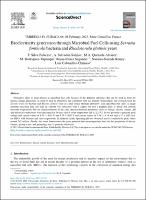Bioelectricity generation through Microbial Fuel Cells using Serratia fonticola bacteria and Rhodotorula glutinis yeast

View/
Author(s)
Silva-Palacios, F.
Salvador-Salinas, A.
Quezada-Alvarez, M.A.
Rodriguez-Yupanqui, M.
Rojas-Flores, Segundo
Nazario-Naveda, Renny
Cabanillas-Chirinos, Luis
Date
2023-06-11Metadata
Show full item recordPublisher
Elsevier
Journal
Energy Reports
Abstract
Nowadays, there is great interest in microbial fuel cells because of the different substrates that can be used in them for electric energy generation. In order to find an alternative and contribute with eco-friendly technologies, this research used the Serratia fonticola bacteria and Rhotula glutinis yeast as a fuel source through laboratory scale microbial fuel cells. A single chamber microbial fuel cell with air cathode was fabricated with a copper foil and a graphite plate as anode and cathode electrode respectively. For the characterization of the cells, physicochemical parameters such as voltage, electric current, pH and electrical conductivity were measured for 30 days and at room temperature (18 ± 2.2 °C). It was possible to generate peak voltage and current values of 0.53 ± 0.01 V and 0.55 ± 0.02 V and current values of 1.76 ± 0.16 mA and 1.52 ± 0.02 mA, for MFCs with bacteria and yeast respectively. In addition, acidic operating pH was observed, and its conductivity peak values around 242 mS/cm. Finally, this work demonstrates the great potential that microorganisms have for the generation of electric current, giving a new and promising way to generate electricity.
Type
info:eu-repo/semantics/article
Rights
info:eu-repo/semantics/openAccess
Language
eng
Collections
- Ingeniería Ambiental [98]

